Palau Macaya in Barcelona hosted the 21st Edition of the Legal Seminar
AIE addresses the challenges artists face in the age of AI
Legal measures in the digital environment, remuneration rights, and new models of music consumption were the focus of the two roundtables held during the event.
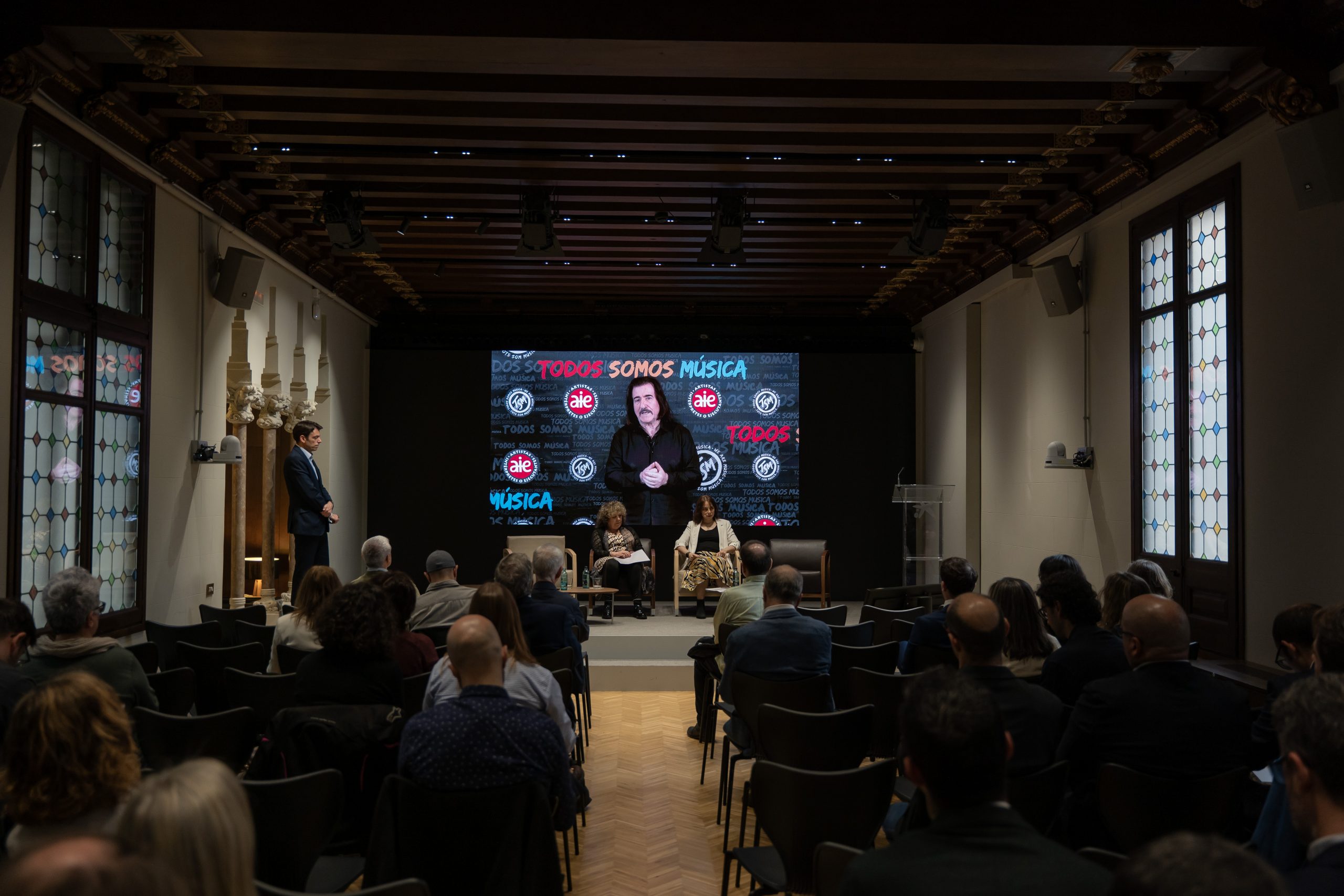
Inauguration of the Seminar by AIE President, Luis Cobos
Barcelona, April 25, 2025 – AIE’s Legal Seminar, SEMINAIE, held its twenty-first edition this year at Palau Macaya in Barcelona, a gem of Catalan modernism. Directed by Álvaro Hernández-Pinzón, AIE’s Global Business Director, the seminar focused on the development of music in the digital environment, offering a practical perspective.
During the opening, AIE President Luis Cobos framed the seminar’s purpose at the intersection of “intellectual property, human rights, and technology”, emphasizing the importance of expert insight in light of the emergence of artificial intelligence. “We are now facing challenges and obstacles that must be addressed by those of us who have chosen to work in the fields of intellectual property, collective management, technology, human rights, and the arts,” he said.
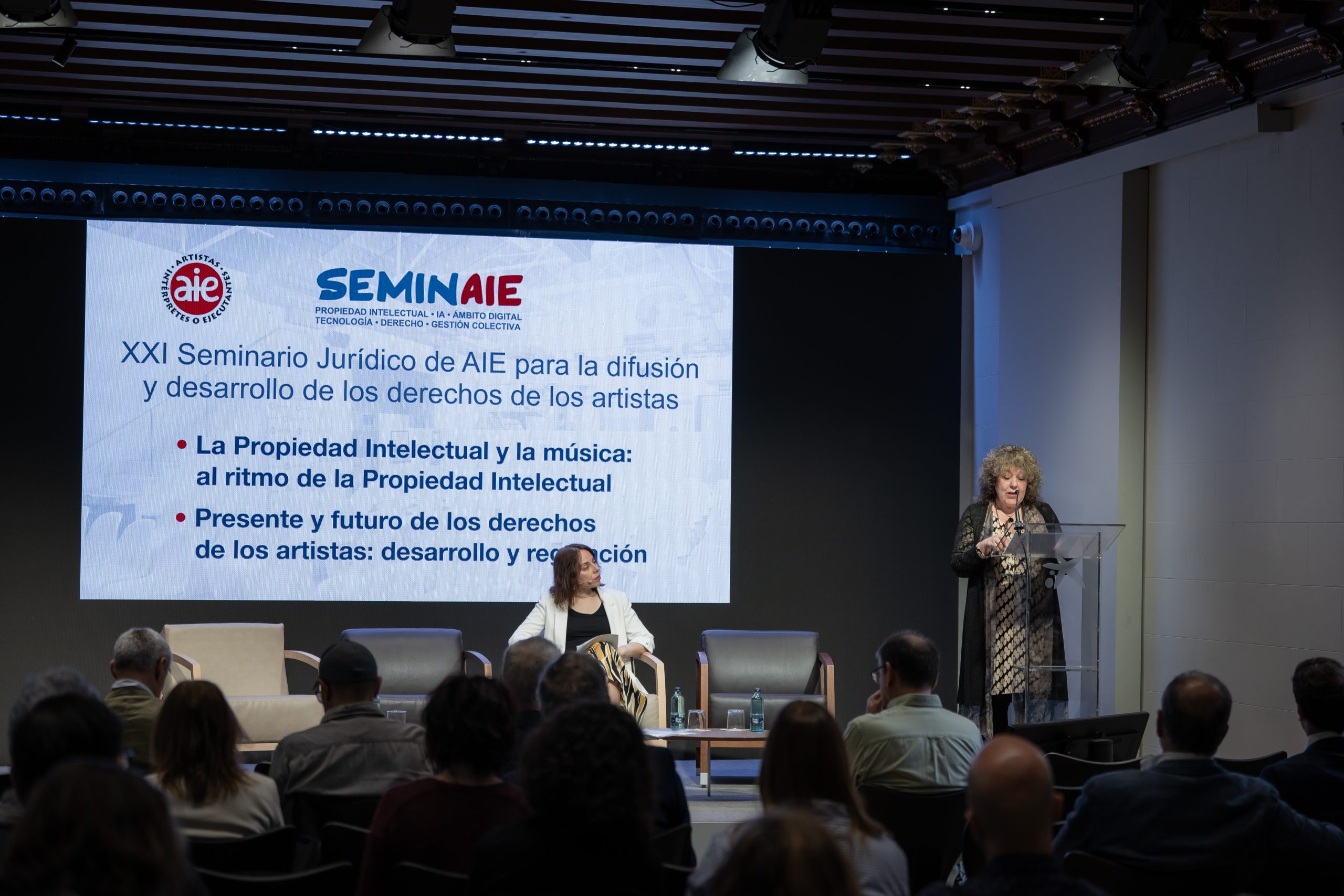
AIE Vice President, Montserrat Pratdesaba, during the presentation
Singer and AIE Vice President Montserrat Pratdesaba expanded on this idea by emphasizing that “the use of our repertoires generates enormous profits, so it is only logical that a portion of those returns go to those of us who create the music heard in venues, on the radio, on television, and through devices, digital platforms, and even AI applications.”
Lastly, Lara Chaguaceda, Deputy Director General for Intellectual Property at the Ministry of Culture, stressed that “collective management is the most efficient mechanism to ensure the effective exercise of intellectual property rights” as “collective management organizations provide their services diligently, efficiently, and without discrimination. They defend repertoires, facilitate negotiations with users, establish mechanisms of solidarity, and generate economies of scale that help promote cultural diversity—something of great importance to the Ministry of Culture.”
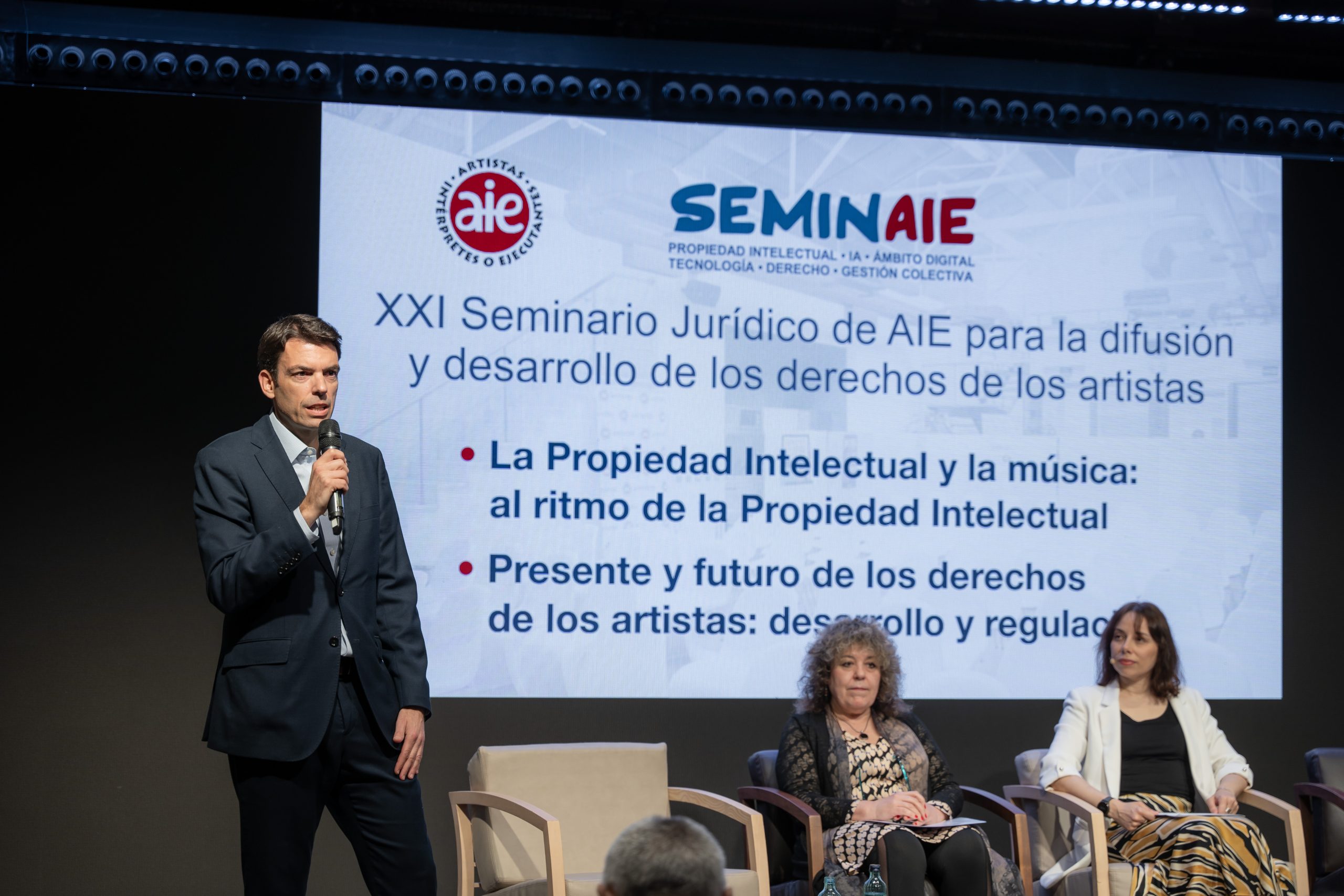
Seminar presentation by its Director, Álvaro Hernández-Pinzón
AI and legal measures in the digital environment
The seminar was structured around two roundtable discussions—“Digital environment and legal measures” and “Towards new models of music consumption”—where experts in technology, music, and intellectual property shared their perspectives from legal, artistic, technical, and economic viewpoints.
During her remarks in the first panel, Digital environment and legal measures, Lara Chaguaceda emphasized that the advent of streaming platforms created a value gap that “is fundamentally characterized by a position of weakness for artists. There are even critical voices pointing out that this gap is not just a remuneration issue, but also a barrier to artistic activity, as algorithms favor the most popular artists and push emerging talent aside.”
“In this regard,” continued the Deputy Director General for Intellectual Property, “the Ministry defends two non-negotiable principles: first, recognition of the work of authors and artists; second, the need for authorization to use protected works and performances, and therefore for proper licensing and remuneration, as well as maximum transparency.”
“This is our stance on fair and adequate remuneration for artists, which—particularly in relation to artificial intelligence—would also require revisiting the directive, especially regarding the text and data mining exception, which we do not consider appropriate for training AI models,” Chaguaceda concluded.
She also confirmed that the Ministry of Culture is holding high-level meetings to gather input from all relevant sectors. “This will allow us to assess the various legal alternatives concerning the use of protected works and performances in the context of artificial intelligence, and to determine how to proceed with the draft Royal Decree.”
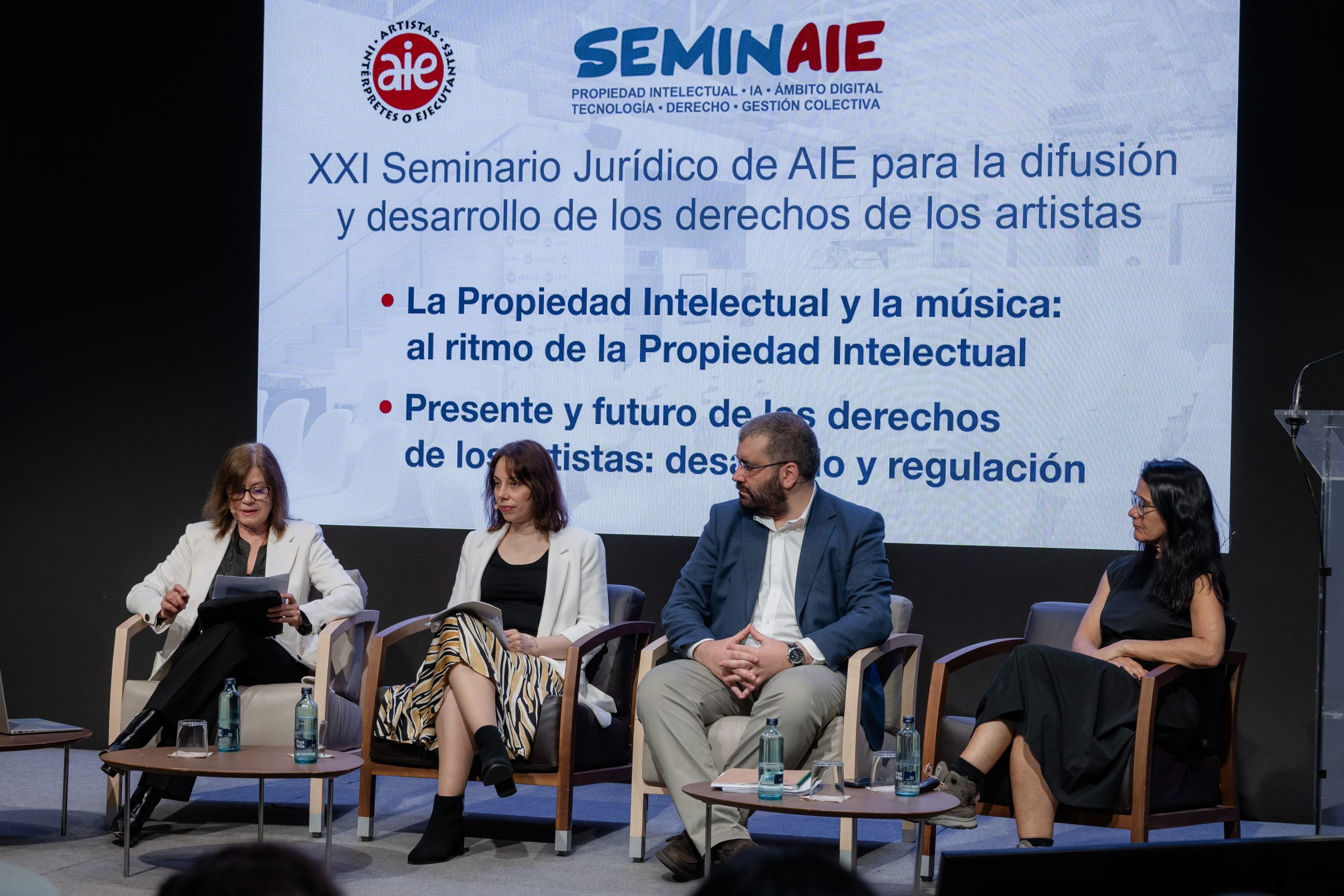
Participants of the first roundtable: Digital environment and legal measures
Remuneration rights under scrutiny by the CJEU
Ricardo Gómez Cabaleiro, Secretary General of DAMA—the Spanish collective management organization for screenwriters and directors—stressed the importance of accurately interpreting the text and data mining. “This exception is being used to argue that AI model training doesn’t require authorization because a limit exists, but we believe that such usage cannot be considered to fall within that exception.”
Gómez Cabaleiro also raised other concerns for creators, such as unresolved issues in the transposition of the 2019 directive, particularly in other countries. He emphasized the relevance of a preliminary question raised in Belgium regarding the recognition of remuneration rights on sharing and streaming platforms—an issue that could impact Spain: “It began in February 2022, when a group of companies including Google, Spotify, Meta, and record labels like Sony and Warner filed a lawsuit challenging the constitutionality of the Belgian law.”
The DAMA Secretary General recalled that although a ruling from the Court of Justice of the European Union (CJEU) is still pending, Spain has already examined the compatibility of remuneration rights with EU general principles, and the Spanish Supreme Court affirmed that such rights are fully compatible. “In any case, while I don’t believe these rights are at risk—because legal doctrine and statutory analysis support them—we shouldn’t panic if there are surprises. The Spanish system is well-balanced, and reform is likely a better path than dismantling.”
The Uruguayan case
The first roundtable closed with remarks from Martha Caviglia, legal advisor to the Sociedad Uruguaya de Artistas (SUDEI), who shared insights from Uruguay: “There are some very positive aspects in our legislation regarding making content available to the public, but there’s a major caveat. We have a good law that is pioneering in recognizing a remuneration right for performers when their work is made available to the public—but two years on, it still hasn’t been implemented,” she explained. “The reality is that, to this day, Uruguayan musicians haven’t received a single peso from music streaming platforms”.
Caviglia described how a confrontation between the Uruguayan government and Spotify unfolded after legislative changes granted performers the right to be remunerated for the digital use of their recordings. “The biggest takeaway was realizing the importance of public communication—to artists and citizens alike. Spotify’s campaign was so strong and intense that it turned artists against their own audience. The government couldn’t withstand the pressure and Spotify secured a tailor-made decree.”
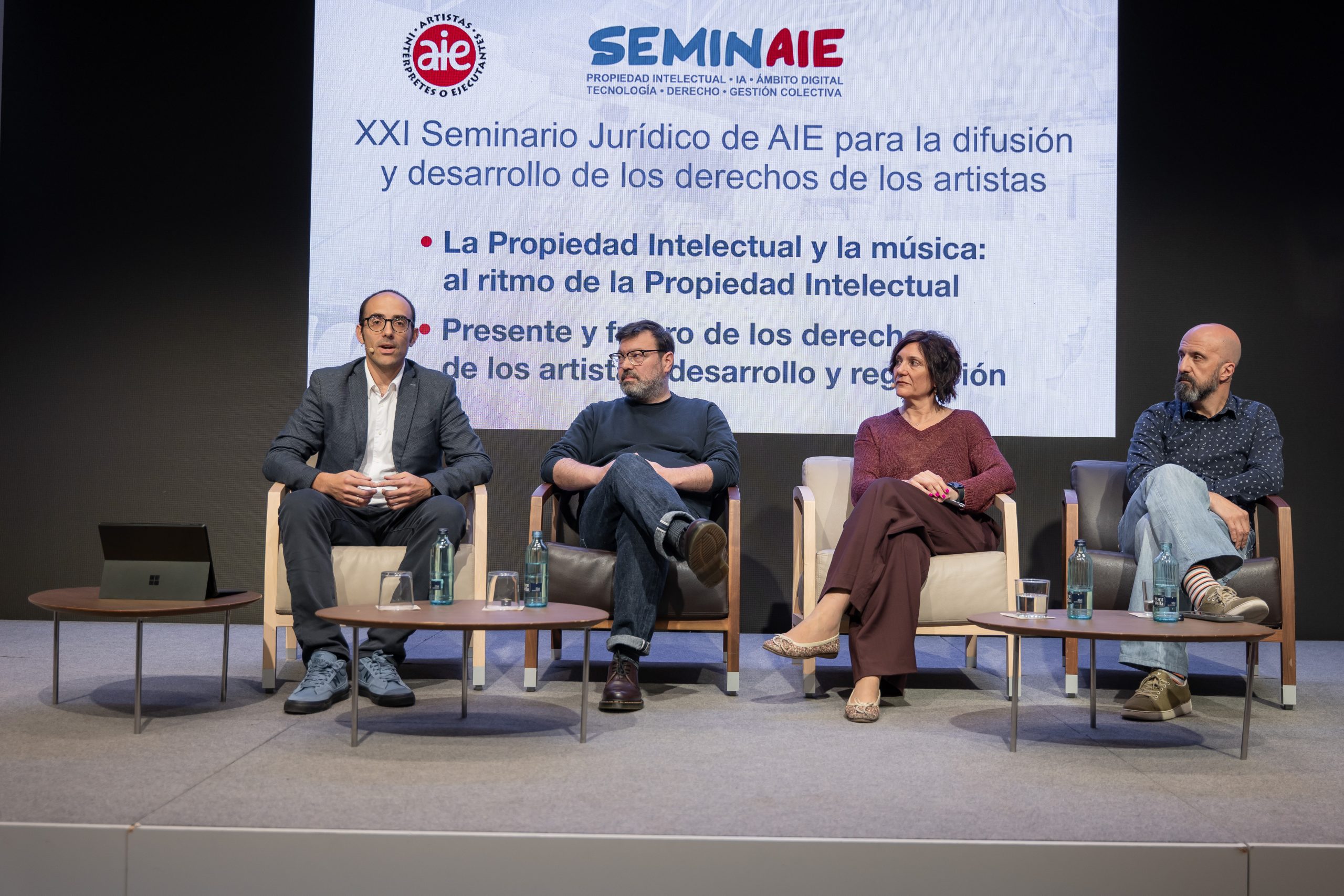
Participants of the second roundtable: Towards new models of music consumption
Towards new models of music consumption
In the second roundtable of the Seminar, Juan Rivas, Juan Antonio Casado, and Raquel Evangelio discussed the influence of AI on new forms of music consumption and distribution.
Juan Rivas, musician, promoter, and project manager at 10ª Planta, began with an in-depth review of the various technical and technological advances that sparked fear in the creative community about losing jobs and how, over time, creators adapted and leveraged these changes.
“What happens when a new technology emerges and changes the rules of the game? Well, from the loom to the metaverse, creators surf the change,” Rivas stated, offering an optimistic view of this disruption. “After an initial phase of fear, the impossible becomes normal: mobile phones, streaming, AI. And what dies is not art, but a business model”.
On his part, technology and digital transformation consultant at Cloud District and AI and data specialist Juan Antonio Casado agreed with Rivas in general terms and pointed out how, up until now, technological evolution has caused disruptive changes, but global earnings for creators have not significantly changed. “The industry is able to generate, capture, and most importantly, monetize a value created by artists, and they need to be able to monetize it,” he explained.
“So where does this lead us? Probably to a business model problem. We already have songs uploaded to streaming platforms that aren’t generated by humans,” he explained. “Also, Suno now acts like a player, competing with Spotify. I not only generate songs with AI, but they’ve also made a reel just like the ones on TikTok, with music that is indistinguishable from that generated by humans.”
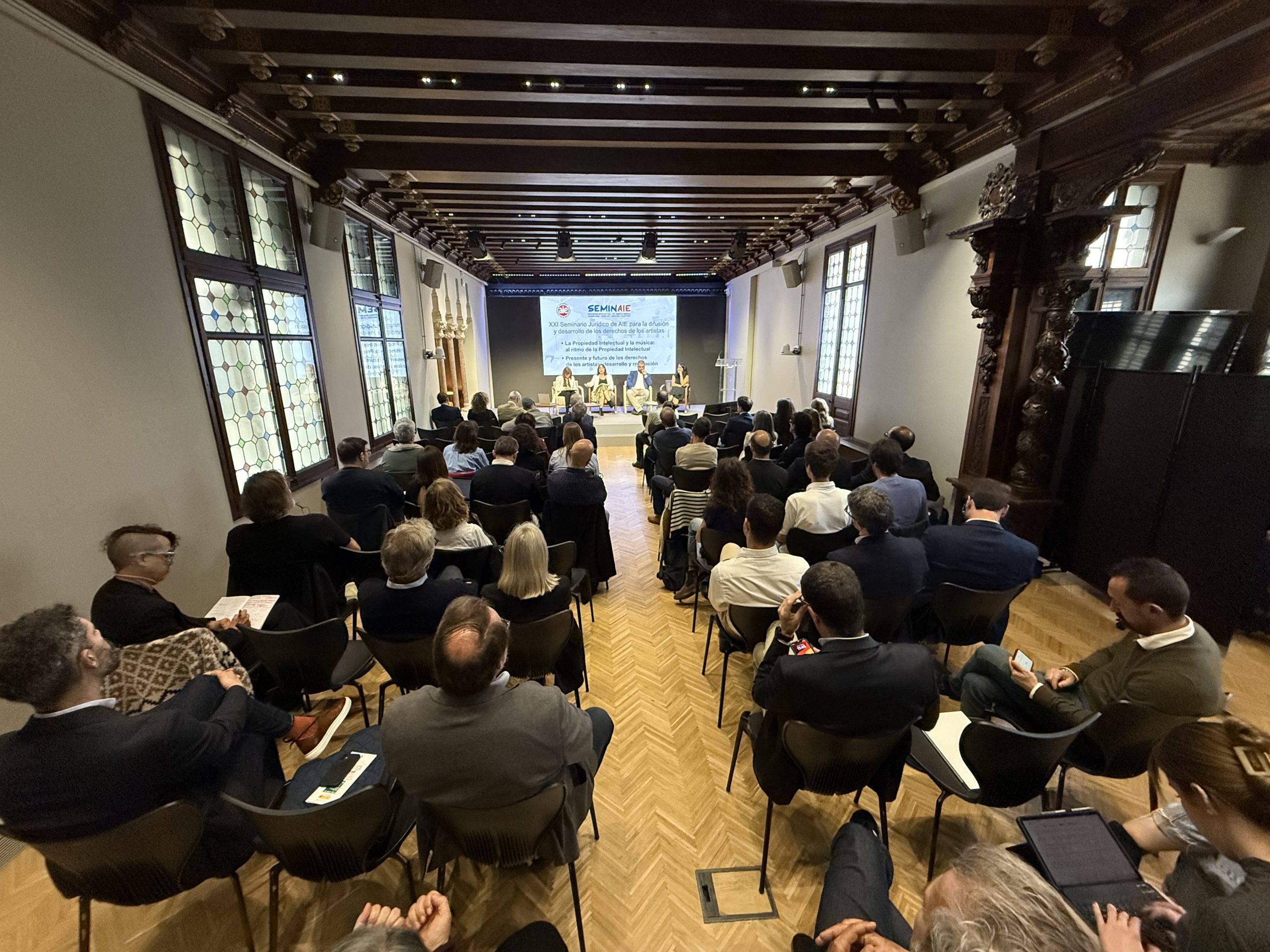
Attendees of the Seminar held at Palau Macaya in Barcelona
And what does the legislation say?
In the final intervention of the Seminar, the role of the Spanish intellectual property law in this scenario was addressed by Raquel Evangelio, professor of Civil Law and director of the Chair of Digital Culture and Intellectual Property at OEI and the University of Alicante.
Evangelio tackled an initial question regarding the use of protected performances for training generative AI systems, specifically whether such cases constitute an act of reproduction. “The key issue is that if there is reproduction, considering that reproduction under current legislation is an exclusive right of authors and artists, we need the consent of the rights holders to use all those works and performances, authorization, or the existence of an exception”, she clarified.
In cases where these uses couldn’t be covered by the exception, there would be two possible solutions. The first, Evangelio recommends, is a licensing system: “In other words, we need authorization from the rights holders because there is no exception that covers the massive use of content, and individual licensing isn’t feasible for millions of works and performances, so collective management is essential.”
“The other solution is to do away with asking for authorization because it would be more practical to move to a compensation system—creating an exception that replaces the current text and data mining exception (which, of course, would need to be compensated, as it isn’t today) and allows the use of works and performances for AI system training in exchange for compensation to the affected rights holders.”
“Above all, transparency is crucial. The providers of generative AI models are obligated under the European AI regulation to publish a detailed summary of the content used to feed the model: if artists don’t know which works or performances have been used, they cannot exercise their rights.”
Another point, concluded Raquel Evangelio, is the type of legal protection that results generated autonomously by AI receive, as current European and Spanish intellectual property regulations prevent them from being considered protectable works or performances, although she believes this could change in the medium term.

